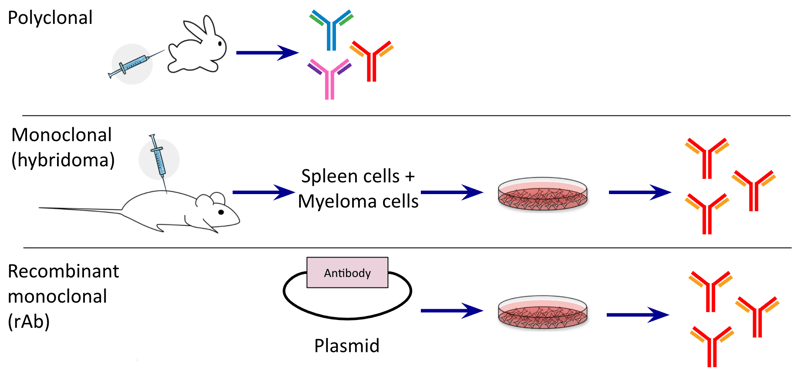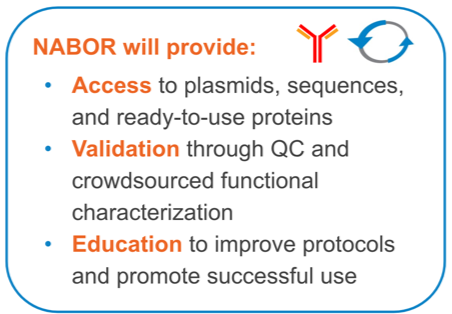Would you buy and use a plasmid if it didn’t include any plasmid sequence data? Of course not. Unfortunately, the vast majority of antibodies are supplied with no sequence information, leading to problems with reproducibility and an inability to improve upon these critical research tools. Addgene is excited to announce that we have recently received a grant from the National Institutes of Health that will address this problem.
The grant, which is part of the NIH’s Brain Research through Advancing Innovative Neurotechnologies® (BRAIN) Initiative, will allow Addgene to create a much needed open-access recombinant antibody/affinity reagent resource for the neuroscience community called NABOR (Neuroscience AntiBody Open Resource). We are delighted to be partnered with Dr. James Trimmer of the University of California Davis School of Medicine on this grant. Dr. Trimmer has created thousands of high-quality antibodies/nanobodies for neuroscience research and is an expert at validating these tools. While the focus of the NABOR platform will be neuroscience reagents and data, the platform can be expanded for any recombinant antibody tool and therefore will grow to serve the entire scientific community.
Why recombinant antibodies?
Animal-based methods for antibody production have several drawbacks. Polyclonal antibodies produced in animals may be variable among animals and bleed dates. The development of monoclonal antibody (mAb) technology circumvented many of these issues by creating immortal antibody-producing cell lines (hybridomas) that secrete antibodies in culture and provide renewable reagents with reliable and reproducible production. However, even clonal hybridoma cell lines can produce more than one mAb (Bradbury et al., 2018), and hybridomas can lose gene expression of the mAb-encoding genes, die, or fail to revive after cryopreservation (Bradbury & Plückthun, 2015a, b).
Recombinant antibodies are plasmid-based and offer numerous advantages, including more secure archiving, unambiguous molecular definition, and potential for further engineering as compared to polyclonal or monoclonal antibodies. You can learn more about recombinant antibodies in this blog post.

Hello, NABOR!
Addgene will bring the same open-access benefits to antibodies that you have come to expect from our plasmid and viral services. The first step will be working with the community to build a resource of plasmids encoding recombinant antibodies as well as other affinity reagents such as single-chain variable fragment (scFvs) and nanobodies. Addgene will produce a subset of this collection as ready-to-use-proteins to facilitate use. Dr. Trimmer’s lab will ensure the quality of the antibodies using quantitative assays such as antibody specific activity for each reagent batch. To supplement this, Addgene will be creating a crowdsourced Data Hub (built off of the concept of our AAV Data Hub) to share further validation data with you.

“Affinity reagents are among the most commonly used reagents in neuroscience research today, but there is a critical unmet need for an open-access, molecularly defined, and well validated collection. I’m thrilled to be working with Addgene to bring this resource to life,” says Dr. Trimmer.
But in order to create such a resource, we need your help. You can participate by depositing your plasmids encoding antibodies, ScFvs, and nanobodies to Addgene! The plasmids will be made available through our usual service (see our current antibody plasmid collection) and we plan to introduce affinity reagents in protein format within the next year.
NIH grants and Addgene’s mission
This is the first NIH grant that Addgene has received. Addgene prides itself on being financially self-sustaining through distributions of research materials, such as plasmids and viral vectors. However, it typically takes a few years for a new project to reach a sufficient number of distributions to cover costs, which can limit expansion into new services. “We appreciate NIH’s vision and support for this project. This grant will allow Addgene to further our mission of scientific sharing,” says Dr. Daniela Bourges, Addgene’s interim Executive Director. “NABOR provides a new model for the creation and acquisition of affinity reagents and will enable researchers everywhere.”
The timing is ideal as the NIH’s BRAIN Initiative has been funding laboratories, such as Dr. Trimmer’s lab, to create recombinant antibodies for use in neuroscience research. More broadly, advances in gene synthesis, affinity reagent screening, and next-generation sequencing of hybridomas have opened the door for a new generation of recombinant affinity reagents.
Addgene is looking forward to working with the community to create a fully transparent resource where researchers can easily share, edit, and access the affinity reagents they need to make their next big discoveries. We welcome you all to be a part of this initiative!
The project will be supported by a NIH BRAIN Initiative grant (NS119916).
The content of this article is solely the responsibility of the authors and does not necessarily represent the official views of the National Institutes of Health.
References and Resources
References
Bradbury A, Plückthun A (2015) Reproducibility: Standardize antibodies used in research. Nature 518:27–29 . https://doi.org/10.1038/518027a
Bradbury AM, Plückthun A (2015) Antibodies: validate recombinants once. Nature 520:295–295 . https://doi.org/10.1038/520295b
Bradbury ARM, Trinklein ND, Thie H, Wilkinson IC, Tandon AK, Anderson S, Bladen CL, Jones B, Aldred SF, Bestagno M, Burrone O, Maynard J, Ferrara F, Trimmer JS, Görnemann J, Glanville J, Wolf P, Frenzel A, Wong J, Koh XY, Eng H-Y, Lane D, Lefranc M-P, Clark M, Dübel S (2018) When monoclonal antibodies are not monospecific: Hybridomas frequently express additional functional variable regions. mAbs 10:539–546 . https://doi.org/10.1080/19420862.2018.1445456
Additional resources on the Addgene blog
- Check out our Antibodies 101 blog post
- Learn more about plasmid-based recombinant monoclonal antibodies
Resources on Addgene.org
Topics: Addgene News, Antibodies






Leave a Comment